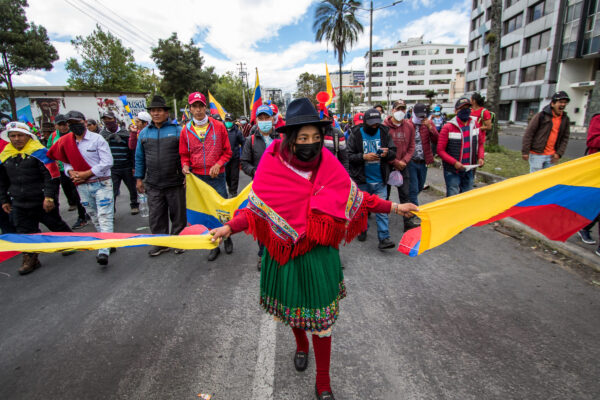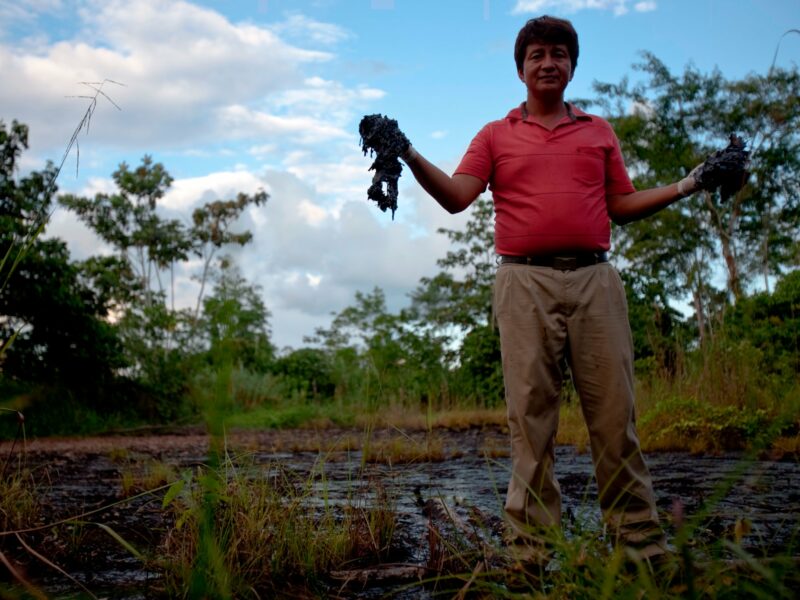Yesterday, Chevron convened its annual shareholder meeting virtually, but not even the digital distance could shield the oil giant from intensifying scrutiny. This year’s AGM came on the heels of a bombshell announcement: the Swiss National Bank decided to sell its entire stake in Chevron because it now considers investments in the stock to breach its portfolio guidelines.
Chevron made no mention of the divestment during the meeting.
Meanwhile, a quarter of Chevron’s own shareholders – representing approximately 436 million shares valued at nearly $60 billion – voted in favor of lowering the threshold to call a special meeting. This 25% support for a corporate governance measure is unusually high and a clear signal of mounting investor concern over Chevron’s misconduct. An additional 11% backed a resolution demanding a third-party human rights report on the company’s operations, echoing growing calls for transparency from frontline communities and rights advocates.
But once again, Chevron responded with denial and deflection. CEO Mike Wirth dismissed the human rights resolution as “unsubstantiated,” ignoring the 19 independent sources cited, and he repeated the falsehood that Chevron’s $9.5 billion pollution judgment in Ecuador was “definitively rejected by the courts.” In reality, Ecuador’s Constitutional Court upheld the verdict, and courts in Canada have affirmed the legitimacy of enforcement efforts – rulings Chevron has chosen to ignore.
Chevron continues to bury its head in the sand rather than listen to affected communities, courts, and now even shareholders. Instead, the company doubles down on disinformation and impunity. CEO Mike Wirth continues his racist allegations that courts and judges in Ecuador are invalid. But the global movement against Chevron’s abuses is growing – and we will not stop until justice is served.
Actor Alec Baldwin, presenting Proposal #7 on behalf of Newground Social Investment, called out the company’s campaign of retaliation:
“Chevron’s key legal witness, Alberto Guerra, admitted under oath that he lied in court and was paid nearly half a million dollars after being coached more than 50 times by Gibson Dunn, Chevron’s law firm. CEO Mike Wirth still refuses to explain how much shareholder money has funded this disgraceful retaliation against Indigenous peoples and their lawyer, Steven Donziger.”
That impunity has sparked global resistance. On May 21, the twelfth annual Global Anti-Chevron Day saw coordinated protests across more than a dozen countries. From California to Nigeria, Argentina to the Philippines, activists called out Chevron’s environmental destruction and complicity in rights abuses – including its co-ownership of fossil gas fields off the coast of occupied Palestinian territory. Chevron refused to address the growing boycott movement or the global day of action.
Leo Cerda of the Kichwa People in Ecuador delivered a powerful message of solidarity on behalf of the resolution calling for a human rights report submitted by the Franciscan Sisters of Allegany.
“Chevron came in, extracted oil, poisoned the land and water, and then walked away. Entire communities were left to face the consequences of corporate negligence. This is a human rights crisis – one where lives were devalued, voices ignored, and justice denied.”
In Ecuador, protests continued today as communities represented by the Union of People Affected by Texaco (UDAPT) rallied against a recent investor-state dispute settlement (ISDS) tribunal award in Chevron’s favor. They are calling on the Ecuadorian government to reject the award and hold Chevron accountable.
Donald Moncayo, President of UDAPT, traveled to California for the week of action and shared this message:
“Shareholders need to understand they’re receiving dirty money – profits that aren’t rightfully earned. This isn’t clean money. It comes from the suffering of people impacted by Chevron’s wrongdoing. The $9.5 billion debt Chevron owes isn’t for lawyers or individual compensation, as the company claims. It’s a court-ordered amount to clean up the soil, water, and sediment in the Amazon, and to support the cultural recovery of the Cofán, Siona, Siekopai, Waorani, Kichwa, and Achuar peoples whose lives and territories have been devastated.”
Human rights attorney Steven Donziger added:
“Chevron’s farce in Ecuador’s court system has gone on for far too long. While Indigenous peoples and farmer communities continue to suffer and die because of the company’s Chernobyl-level pollution, Chevron executives flout the rule of law and refuse to comply with court judgements. Amazon communities face extinction while the company delivers record profits to its shareholders and executives. It’s unconscionable. All pension funds and investors should divest from the company immediately until it complies with the rule of law and respects our planet.”
Chevron may continue to ignore the writing on the wall – but the tide is turning. From shareholders to international banks, from communities in Richmond to the rainforests of the Amazon, the call for accountability is louder than ever. And it’s not going away.













